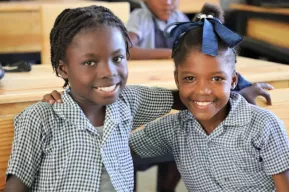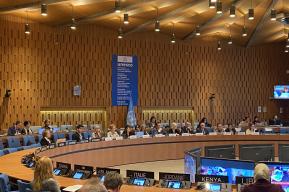News
ECOSOC: Ministerial Meeting on Education and Gender Equality
On 9 July 2014, on the margins of the High Level Segment of ECOSOC, UNESCO, UN Women, and the Permanent Missions of Bangladesh and Denmark co-organized a Ministerial Breakfast on ‘Education and Gender Equality: Protecting our girls from violence and discrimination in education’.
The event featured participation of ministers, ambassadors, heads of delegations as well as representatives of the UN system and civil society.
The debate focused on sharing experience, raising awareness and identifying holistic approaches for removing the barriers to girls’ access, transition and completion of education.
The Director-General of UNESCO, Ms Irina Bokova, made a strong call for “promoting quality education as a human right, as a force for human dignity and for empowering women. As the United Nations agency for education, UNESCO stands with each and every girl, to help their dreams come true, working with our partners and with Governments where needs are most acute.”
The Director-General recalled that fighting the recent stagnation in the field of education called for an accountability framework with clear stakeholders’ role. In this context, UNESCO is assisting in the drafting of the national reports on the Education for All process that will culminate in the World Conference on Education in Korea, May 2015.
In addition, Ms Bokova stressed the “need to build steps to defend girls’ right to inclusive and quality education at all levels into the post-2015 development agenda” as ‘this agenda should provide a framework for ambitious efforts to ensure girls and young women are protected from violence and discrimination in law and in practice”.
The Permanent Representative of Bangladesh to the UN Ambassador Abulkalam Abdul Momen told the success story of his country’s investment in girls’ education and their role as a champion for the Global Education First Initiative. The Ambassador urged the international community to work towards improving the collaboration between the donor and recipient countries and encouraged stronger political and financial commitments to invest into girl’s education.
Another advocate for eliminating gender-based violence in and around school was the Permanent Representative of Denmark Ambassador Ib Petersen, who outlined that despite the progress achieved in the field of girls’ education “recent years have shown that progress has slowed down”.
He made a strong point on the need to have an ambitious goal on education in the Post 2015 Agenda that will extend the universal access to secondary school, will include a strong focus on quality education and will ensure that special interventions are targeted at the most marginalized, including girls
The Minister of Gender Equality of Ghana Ms Nana Oye Lithur shared the example of her government’s major interventions to improve the access and quality of education for girls, including by establishing a comprehensive institutional and administrative arrangements that facilitates effective sharing of ideas and information.
The Assistant Minister for Multilateral Affairs of Croatia Ms Vesna Batistic Kos highlighted the issue of vulnerability of girls during armed conflicts and the related barriers for the realisation of their right to education.
In this respect, the head of the UK delegation, Mr Anthony Smith, reminded the participants about the upcoming Girls Summit, on female genital mutilation and forced marriage, to be held on 22 July in London.
Many participants highlighted that education for girls is a fundamental human right that remains illusive in far too many countries. The discussion highlighted the multiple reasons why girls are not accessing, staying and transitioning through education -- including, poverty, geographical isolation, child marriage and pregnancy, gender-based violence and other discriminatory socio-cultural practices, lack of water and sanitation, attitudes and perceptions about the role and status of girls and women.






